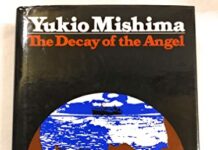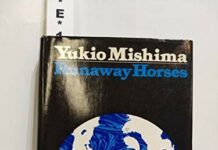
Ebook Info
- Published: 2013
- Number of pages: 194 pages
- Format: EPUB
- File Size: 0.72 MB
- Authors: Yukio Mishima
Description
Set in a remote fishing village in Japan, The Sound of Waves is a timeless story of first love. A young fisherman is entranced at the sight of the beautiful daughter of the wealthiest man in the village. They fall in love, but must then endure the calumny and gossip of the villagers.
User’s Reviews
Reviews from Amazon users which were colected at the time this book was published on the website:
⭐It’s fair to say that this past year, my reading life has been dominated by Japanese writers. I’ve been a late enthusiast of Haruki Murakami’s work, but I’ve happily read all of it in the last three years. Just before the New Year I was introduced to the work of Yasunari Kawabata through which I was swept, awe-struck through his whole ouevre. Soon after that, I read my favorite book of all time, Natsume Soseki’s I Am A Cat. Of course I read him through, though crest-fallen at the lesser prominence of felines in his later novels. Despite that, Soseki was my favorite Japanese writer, but perhaps my favorite writer of all.Kawabata’s colleague, confidant and competitor, ultimately prevailing in his winning of the Nobel Prize for Literature, Yukio Mishima, was someone I’d heard of but never assayed.Yukio Mishima is my favorite writer. I was fully committed to bingeing his work after my introduction via Michael Gallagher’s supremely sympathetic English translation of The Sea of Fertility’s first volume, Spring Snow. Committed as I was, I read his earliest novels, Confessions of a Mask (1949) and the formidable Forbidden Colours (1951-53). I found Alfred H. Mark’s translation of Colours irritatingly clunky in a way that made me suspect I was misapplying the abrupt and awkward prose to Mishima’s immature work. My acquaintance with Meredith Weatherby’s astonishing translation of Confessions of a Mask thoroughly disabused me of any feeling of young Mishima’s shortcomings or brashness, properly laying the blame on the lame Alfred Marks. I own the next in chronological line of Mishima’s work, Thirst For Love (1950), but, Marks having been the sole translator of that early work, I think I’ll save it for a later date.Luckily, the inestimably talented and sympathetic translative ear of Meredith Weatherby was the English voice of The Sound of Waves (1954) which I’ve now read in a white heat. Mishima has written widely for the stage, and in this book and in the few others I’ve read, I am struck by his gifted command in shaping dramatic situations, dynamics both personal and elemental, as the ambience and engine of his narrative. I have also been overwhelmed with his imagery, wherever I’ve encountered it, with his empathetic descriptions of the sea and surf.After the homoerotic cosmopolitan immersions of contemporary Tokyo that are Mishima’s Mask and Colours, it was bracing to say the least to find ourselves landed in the simpler setting of a humble fishing village on the small Japanese island, Uta-Jima (invoked as the first sonority, the first word of the novel)I have always been arrested by the fierce intensity and laminate beauty of Mishima’s water imagery, but The Sound of Waves is a whole redolent universe of such astonishing evocation. It is also an unabashed, intimately compassionate and compelling love story of two children of the island, Shinji, a young apprentice fisherman, and a daughter of the diving class of island women, Hatsue. As with Confessions of a Mask, one innate talent of Mishima is in his depiction of young love, of emergent sexuality. I am confident there has never been such a master of this dynamic of innocence and awakening since Vladimir Nabokov.As much of the novel takes place in the sea, with its dangers and daring, its implacable strength and eternity, much of the dramatic and emotional action takes place within the torii of the modest pinnacle of the island, the Yoshiro Shrine. And the true nexus of intrigue and destiny takes place at the electrical shrine dispelling darkness, danger and mystery, the lighthouse.A writer friend of mine, someone who’d been badgering me to continue with the Three-Body Problem trilogy, when I apologized that I could not abandon my Mishima n=binge, understood, saying that it was a problematic calculus, Cixin Liu’s prophecies and epiphanies coming once every 100 pages, arriving in Mishima with every phrase.Every characterization is true. There are no mechanistic caricatures like in a Dickens novel. Even when making right decisions, the frailty and foibles of those molding the fate of the protagonists may not state their judgements in ways that fulfill our own sense of justice and morality, but justice prevails nonetheless, and the characters and their colloquy are always true to themselves.There are cliff-hangers in this love story, matters of bravery and menace, revelations of dark and ungenerous natures, the sanity and sanctity of suicide, morality of simple origins, intrinsic fear of modernity. The book is rich and enriching.I feel like every Mishima book I read will become my new favorite. That’s an unfair presumption but nonetheless true with The Sound of Waves.
⭐Very interesting love story from a country and standpoint I’ve never come across before. But it did reinforce the great truth that love is the same world wide…and so is the meanest of others, that sometimes accompanies it. But thankfully, love does prevail.
⭐Mishima’s love poem to an island, wrapped in a traditional story of young, forbidden love. This was my first Mishima. Like the best poets, Mishima paints vivid pictures of the natural world. The island of Uta-jima comes alive on the pages, its surrounding waters equal parts beautiful and dangerous, its beaches diverse, its ecosystem unique. The love story is familiar, especially for those of us who grew up in small communities where farming and gossip are the primary local trades. For the most part, Mishima likes his characters, even the ones who clearly are not the heroes. In fact, he may like his characters a bit too much, at least in this early stage of his career, as the heroes are somewhat overloaded with virtue. It was also odd to me, that we learn so much about the breasts of the female inhabitants of Uta-jima. But I’m fond of breasts, and you could do worse than have someone of Mishima’s capabilities describe them for you.
⭐This was a nice (short) read – and `nice’ is not a word that usually comes to mind when reading the works of Yukio Mishima. The Sound of Waves doesn’t have the suicides and violence of other Mishima works – something I don’t miss – but it also lacks his usual depth of character study and glorious prose – that I do miss. The key characters are altogether too nice, too perfect. Shinji, the handsome, brave, self-effacing youth who never told a deliberate lie until page 156 of the book – and Hatsue, much the same, but with perfectly perky breasts. It seemed that Mishima grew tired of these too perfect creations and rushed the book to its happy conclusion. I kept anticipating the emergence of a savage twist, but it was not to be – all was happiness and light. I suppose Mishima may have written this as an allegory for what he (perhaps) secretly hoped his life could be – and I think John Nathan explained in Mishima’s biography that he was influenced by a fascination with Greek legends and sculpture at this time – but thankfully he returned to the Mishima we love with later works.Can’t say I would recommend this book, other than as an interesting part of Mishima’s canon of work. The Vintage International edition is worth reading for their hilarious profile of Mishima – `born into a samurai family, imbued with the code of complete control over mind and body and loyalty to the Emperor’ – utter nonsense!
⭐This book is about love in its purest form, but oddly enough it doesn’t hit you over the head with it: a testament to Mishima’s beautiful writing and also to the deeper meaning of the story. The main characters Shinji and Hatsue are traditional in every sense and he is drawn to her at first sight, then comes a chance for them to get it on but they don’t, even though everyone thinks they did, no thanks to the antagonists Chiyoko who has been westernized along with Yasuo who tries to get it on with Hatsue in a not so traditional way. Mishima was certainly disillusioned with his changing Japan and longed for a return to its traditional roots and this book shows that, as good old tradition triumphs in the end and the antagonists come to some sort of realization of the error of their ways. And like i said, this is the beauty of Mishima’s writing, in that first and foremost this is a romance about two teenagers falling in love, but by the end you realize that it is so much more. Mishima was great indeed.
⭐Though this a classic coming of age / love against the odds story, it is also – perhaps more so – the story of a place. The sea and its rhythms, its beauty and its danger, its sounds and its smells, are constantly present, as is the tightly knit life of the small island on which the characters live, nurturing and holding them with its traditions even as it at times threatens to stifle them. Mishima writes with elegance, clarity, delicacy and the lightest of touches, There are darker undercurrents too, though; the humiliation of Japan in the Second World War is very recent, and the whiff of frustrated desire must surely have been drawn from Mishima’s own struggle with his forbidden homosexuality.
⭐Mishima’s best is no-doubt the sea of fertility tetralogy, but The Sound of Waves is a pleasant short novel, or long novella, less gloomy and wistfully, even uplifting, somewhat like After the Banquet but in an entirely different setting. This has Shinji, an uneducated young fisherman on an island off the coast of Japan pursue the daughter of the community headsman, the overbearing owner of several vessels. The girl, Hatsue, a former pearl diver, is well disposed, but her father is in no mood to condone anything so newfangled as a love match. Yet tradition also involves respect for courage and character, virtues in which Shinji is not lacking, and perhaps all is not as hopeless as it looked. Nor does The Sound of Waves, in spite of first appearances, present the picture of a traditional Japan stuck in its ways. On the contrary, set in the 1950s, it has its characters do such things as listen to the radio and take bus trips to Tokyo. Indeed, subtly, what Mishima brings to light is the picture of a country that is fast changing yet retaining, at least in pockets such as the island of Utajima, its traditional values. Beautifully written, this novel will serve as a good introduction to the author, or alternatively as a fine piece for anyone who has read his more major works.
⭐Simple, easy to read, nice plot, nice descriptions of the island where the adventure takes place and the ins and outs of day to day life.This is the tale of a young man falling in love with a rich magnates daughter. He has to overcome grand expectations, virulent rumours, being outcast and his humble roots to win her hand and get off the breadline. He does so through good character, hard graft and honesty! All of this is set on a small Japanese island where thefts don’t happen, fishing and peal diving is the principle occupation and where mainland Japan seems far, far away. For characters we have an innocent girl, a strong posturing young man, a proud hawkish mother, an overbearing father and hooligan rich kid… all the people you could want for a moving plot!A few bits are a tad loose but what can I say, it is undeniably a good read.
⭐Yukio Mishima blazed a path through Japanese fiction in the fifties and sixties,just as he was reaching the peak of his powers he committed ritual suicide and the world lost a great voice from the orient…”The Sound of Waves” is set on a small island in the Gulf of Ise,Eastern Japan. This short but brilliantly formed tale follows the paths of two star crossed lovers as they court each other tentatively amid the hard working lives they lead on the island.Flora,fauna,dialogue,narrative and plotlines are delicately woven around a beautiful location and an age old story. Mishima reads very well, his use of metaphor and similie is exceptionally good and i highly recommend this 1956 novel to all readers,not just fans of Japanese fiction.
⭐This novel in translation was interesting, as it provides great insight into Japanese fisher folk and their traditions, as well as into social mores in a small fishing community. The title is justified as the community’s life is dependent on the sea. It is very easy to read. However, I found that the novella (for it is little more than that) lacked depth in both characterisation and also in any moral conveyed or analysis of cultural issues, as it comes across as a simplistic love story. It is recommended as a light, quick read.
Keywords
Free Download The Sound of Waves (Vintage International) in EPUB format
The Sound of Waves (Vintage International) EPUB Free Download
Download The Sound of Waves (Vintage International) 2013 EPUB Free
The Sound of Waves (Vintage International) 2013 EPUB Free Download
Download The Sound of Waves (Vintage International) EPUB
Free Download Ebook The Sound of Waves (Vintage International)




